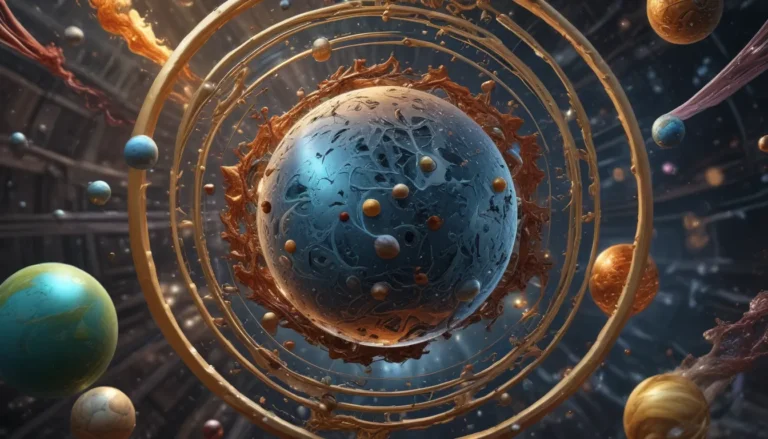A Note About Images: The images used in our articles are for illustration purposes only and may not exactly match the content. They are meant to engage readers, but the text should be relied upon for accurate information.
Gravity is a force that shapes the universe in incredible ways, from holding planets in orbit to warping spacetime. Let’s dive into the extraordinary facts about gravitation that will leave you in awe of its power and beauty.
Universal Gravitational Force
Gravity acts universally on all objects with mass or energy, from tiny pebbles to massive planets. This force governs the movement of celestial bodies and everyday phenomena like objects falling to the ground.
The Solar System’s Stability
The gravitational force exerted by the sun is essential for keeping planets in their orbits. Without this force, the planets would wander aimlessly in space, leading to chaos in our solar system.
The Discovery of Gravitational Waves
In 2015, the Laser Interferometer Gravitational-Wave Observatory (LIGO) detected gravitational waves, which are ripples in spacetime caused by the movement of massive objects like black holes and neutron stars. This groundbreaking discovery opened new avenues for studying the universe.
Curving Light Paths
According to Einstein’s theory of general relativity, gravity can bend light as it passes through a gravitational field. Astronomers have observed this phenomenon, known as gravitational lensing, confirming the theory’s predictions.
Time Dilation by Gravity
The warping of spacetime by gravity can affect time. In the presence of a strong gravitational field, time actually slows down relative to areas with weaker gravitational forces. This concept is crucial for technologies like GPS satellites.
Black Holes and Their Gravitational Pull
Black holes exhibit incredibly strong gravitational pull, so intense that not even light can escape. However, their gravity can still influence objects outside the event horizon, impacting the motion of nearby stars and gas clouds.
The Gravitational Constant
The strength of the gravitational force is determined by the gravitational constant, denoted by G. This fundamental value in physics governs the magnitude of gravitational interactions between objects.
Gravity’s Mysteries
Despite our progress in understanding gravity, significant questions remain unanswered. Scientists are working to reconcile general relativity, which explains gravity on a cosmic scale, with quantum mechanics, the theory governing the microscopic world.
Exploring the Depths of Gravitation
Gravity is a fundamental force that shapes the laws of physics and our understanding of the universe. The study of gravity continues to captivate scientists as they unravel its mysteries and push the boundaries of knowledge.
Conclusion: Embracing the Wonders of Gravity
Gravitation is a captivating force that influences the behavior of objects on various scales, from the microscopic to the cosmic. The extraordinary facts about gravity discussed here scratch the surface of its intriguing nature, inviting us to delve deeper into its mysteries.
As we expand our knowledge of gravitation, we gain a deeper appreciation for its role in the cosmos. Whether studying planetary motion or exploring the vast expanse of space, gravity remains a fundamental aspect of our existence.
FAQs: Exploring Gravity Further
-
What is gravitation?
Gravitation is the force of attraction between objects with mass, governing the movement of celestial bodies and everyday occurrences. -
Who discovered gravitation?
Sir Isaac Newton formulated the law of universal gravitation, building on the contributions of earlier scientists like Galileo Galilei and Johannes Kepler. -
How does gravity work?
According to Einstein’s theory of general relativity, gravity results from the curvature of spacetime caused by mass, guiding the paths of objects through this distorted space. -
Can we observe gravity?
While we cannot directly observe gravity, its effects are visible in planetary motion, tidal phenomena, and the bending of light around massive objects. -
How fast does gravity travel?
According to the theory of relativity, gravity propagates at the speed of light, influencing the behavior of objects through its reach. -
Are there unknown aspects of gravity?
While our understanding of gravity is extensive, mysteries like dark matter and dark energy challenge our complete comprehension and may alter our perception of gravitation. -
Can gravity exist without mass?
Gravity requires mass to exist, with more massive objects exerting a stronger gravitational pull on surrounding matter. -
What are gravitational waves?
Gravitational waves are ripples in spacetime caused by the acceleration of massive objects, offering insights into the dynamics of gravity in the universe. -
Can gravity be shielded or canceled?
Gravitation cannot be fully shielded or canceled, but its effects can be counteracted by other forces in specific scenarios.
Engaging with the Wonders of Gravity
Gravity’s intricate properties continue to spark curiosity and awe in those who study it. Whether bending light or distorting time, this essential force shapes our universe in mesmerizing ways. Delve into the depths of gravitational mysteries and unravel the secrets of the cosmos with a newfound appreciation for the invisible force that binds us all—gravity.






